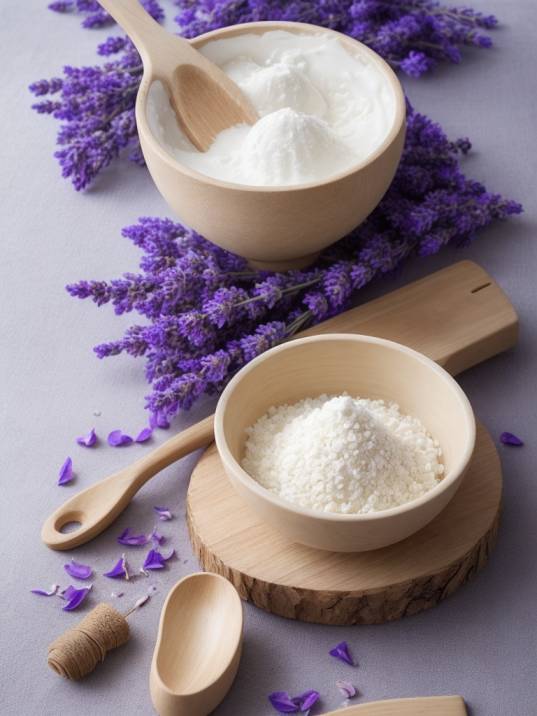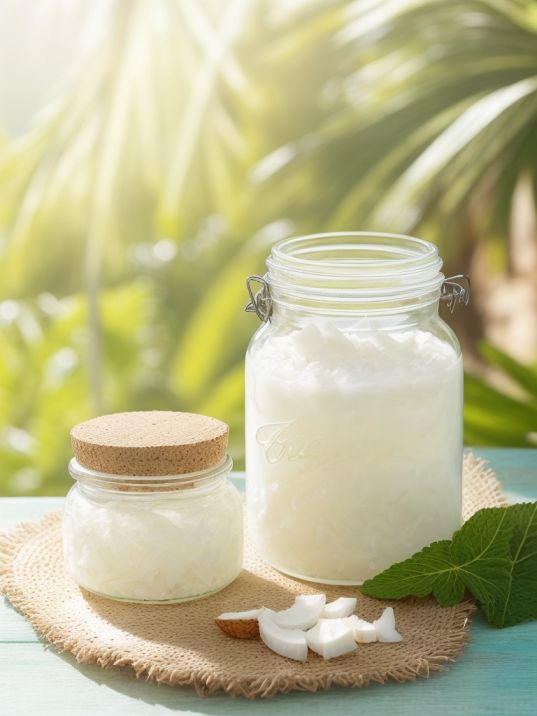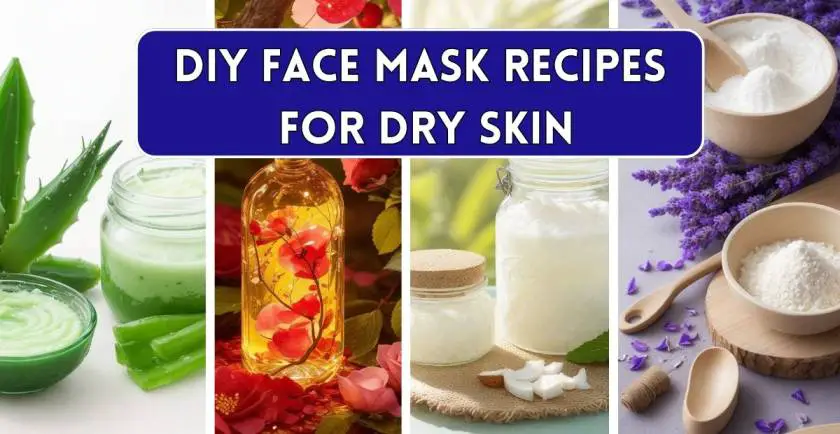Dry skin can be challenging to manage, leaving your complexion dull, flaky, and uncomfortable. However, there’s good news! Nourishing face masks made from natural and moisturizing ingredients can be a game-changer for dry skin types. In this blog post, we’ll explore the benefits of homemade face masks and share some easy-to-make DIY Face Mask Recipes for Dry Skin that will leave your skin feeling hydrated, radiant, and revitalized.
Understanding Dry Skin
Understanding dry skin is crucial for tailoring effective skincare routines and choosing the right products to alleviate its symptoms. Dry skin is a common skin type characterized by a lack of moisture and lipids in the outermost layer of the skin, the epidermis. This leads to a compromised skin barrier, which hinders its ability to retain water effectively.
Key Characteristics of Dry Skin:
- Tightness and Itchiness: Dry skin often feels tight, especially after washing or exposure to harsh weather conditions. It may also experience itchiness due to dehydration and lack of moisture.
- Flakiness and Scaling: Dry skin tends to develop flaky patches, which can be more noticeable in certain areas, like the cheeks and forehead. These flakes occur as dead skin cells build up and are not shed properly.
- Dull Appearance: Dry skin can lack the natural radiance and glow that well-hydrated skin exhibits. This can make the skin look dull and lifeless.
- Fine Lines and Wrinkles: The lack of moisture in dry skin can contribute to the early appearance of fine lines and wrinkles, making the skin look older than it is.
Factors Contributing to Dry Skin:
- Environmental Factors: Cold and dry weather, low humidity levels, and excessive sun exposure can strip the skin of its natural oils, leading to dryness.
- Age: As we age, the skin’s natural oil production decreases, making it more susceptible to dryness and moisture loss.
- Harsh Skincare Products: Using cleansers and exfoliants that are too harsh or contain alcohol can further dehydrate the skin and disrupt its natural balance.
- Hot Showers: Prolonged exposure to hot water during showers or baths can strip the skin of its natural oils, contributing to dryness.
- Medical Conditions: Certain medical conditions, such as eczema, psoriasis, and thyroid disorders, can also cause or exacerbate dry skin.
Caring for Dry Skin:
To effectively manage dry skin, it’s essential to adopt a consistent skincare routine tailored to its needs:
- Use a Gentle Cleanser: Opt for a mild, soap-free cleanser that won’t strip the skin of its natural oils. Cleansing should be done with lukewarm water to avoid further drying.
- Moisturize Regularly: Apply a rich, hydrating moisturizer immediately after cleansing to lock in moisture and nourish the skin.
- Choose Suitable Skincare Products: Look for products labeled “for dry skin” or “hydrating,” and avoid those with harsh chemicals or alcohol.
- Exfoliate Gently: Regular exfoliation can help remove dead skin cells and promote better absorption of moisturizers. However, use a gentle exfoliant suitable for dry skin and limit it to once or twice a week.
- Protect from the Sun: Always wear sunscreen with at least SPF 30 to shield the skin from harmful UV rays and prevent further moisture loss.
Benefits of Homemade Face Masks for Dry Skin
Homemade face masks offer numerous benefits for individuals with dry skin, providing a natural and effective solution to address their specific skincare needs. Here are the key benefits of using homemade face masks for dry skin:
- Natural Ingredients: Homemade face masks are made from natural ingredients that are free from harsh chemicals and synthetic additives. These ingredients are gentle on the skin and reduce the risk of irritation or allergic reactions, making them suitable for sensitive, dry skin.
- Hydration and Moisture Retention: Homemade masks are formulated with moisturizing ingredients like honey, avocado, aloe vera, and oatmeal, which are excellent for hydrating dry skin. These ingredients act as humectants, attracting and retaining moisture, helping to alleviate dryness and restoring the skin’s suppleness.
- Customizable Formulations: One of the biggest advantages of homemade masks is their customization. Users can tailor the recipes based on their specific skin concerns and preferences. This flexibility allows individuals to experiment with different combinations of ingredients to find the best mask for their unique skin type.
- Cost-Effectiveness: Homemade face masks are usually made from ingredients readily available in the kitchen or pantry. This makes them cost-effective compared to commercial skincare products, which can be expensive, especially for those with specific skincare needs like dry skin.
- No Harsh Preservatives: Unlike store-bought masks, homemade masks do not contain harsh preservatives or synthetic fragrances. These chemicals can be detrimental to dry skin, causing further irritation and dehydration. With homemade masks, individuals have better control over the ingredients used, ensuring a more natural and skin-friendly product.
- Nutrient-Rich Formulas: Homemade face masks often incorporate fruits, vegetables, and other natural ingredients rich in vitamins, minerals, and antioxidants. These nutrients provide essential nourishment to the skin, promoting overall skin health and a radiant complexion.
- Relaxation and Self-Care: Applying a homemade face mask can be a relaxing and enjoyable self-care ritual. Taking the time to pamper the skin and engage in a skincare routine can reduce stress and contribute to a sense of well-being.
- Enhanced Absorption: Homemade masks allow for longer contact time with the skin, promoting better absorption of beneficial ingredients. This ensures that the skin receives maximum benefits from the mask’s hydrating and nourishing properties.
- Sustainability and Eco-Friendly: Creating homemade masks reduces the need for single-use packaged products, contributing to a more sustainable and eco-friendly skincare routine.
Essential Moisturizing Ingredients:
- Shea Butter: Rich in vitamins A and E, shea butter is a powerful moisturizer that helps lock in hydration and soothes dry, irritated skin.
- Jojoba Oil: Similar in structure to the skin’s natural oils, jojoba oil effectively moisturizes without leaving a greasy residue, making it ideal for dry skin.
- Coconut Oil: Coconut oil is a natural emollient that deeply nourishes and softens dry skin, leaving it smooth and hydrated.
- Glycerin: Glycerin is a humectant that draws moisture from the air to the skin, providing long-lasting hydration.
- Rosehip Seed Oil: Packed with essential fatty acids, rosehip seed oil helps improve skin elasticity and hydration, reducing the appearance of fine lines.
- Almond Oil: Almond oil is rich in nutrients that moisturize and protect the skin, making it suitable for soothing dry, sensitive skin.
- Hyaluronic Acid: Known for its excellent water-retaining properties, hyaluronic acid helps plump and hydrate dry skin, reducing the appearance of fine lines and wrinkles.
- Cucumber: Cucumber has a high water content and soothing properties, making it beneficial for hydrating and calming dry, irritated skin.
- Green Tea Extract: Green tea is a natural antioxidant that helps combat dryness and promotes a healthy, radiant complexion.
- Papaya: Papaya contains enzymes that gently exfoliate and moisturize dry skin, leaving it soft and supple.
These ingredients can be used in various combinations to create effective DIY face masks for dry skin, providing much-needed moisture and nourishment to achieve a revitalized and hydrated complexion
5 DIY Face Mask Recipes for Dry Skin
1. Shea Butter and Jojoba Oil Mask:

The Shea Butter and Jojoba Oil Mask offer exceptional benefits for dry skin. Shea butter deeply moisturizes, nourishes, and soothes the skin, alleviating dryness and tightness. Jojoba oil, similar to the skin’s natural oils, provides effective hydration without a greasy feel. Together, they form a powerful combination to restore the skin’s natural moisture balance, improve skin elasticity, and reduce the appearance of fine lines. This mask leaves the skin soft, supple, and rejuvenated, making it an excellent addition to any dry skin care routine.
Ingredients:
- 1 tablespoon shea butter
- 1 teaspoon jojoba oil
Instructions:
- Melt the shea butter in a double boiler or microwave.
- Mix in the jojoba oil until well combined.
- Allow the mixture to cool slightly but remain creamy.
- Apply the mixture to your face and leave it on for 15-20 minutes.
- Gently massage your skin before rinsing off with lukewarm water.
2. Coconut Oil and Glycerin Mask:

The Coconut Oil and Glycerin Mask is a boon for dry skin. Coconut oil’s rich emollient properties deeply nourish and soften the skin, while glycerin acts as a humectant, drawing in and retaining moisture. This potent blend effectively hydrates and rejuvenates dry, parched skin, leaving it smooth and revitalized. The mask’s natural ingredients work together to combat dryness, restore the skin’s suppleness, and provide a protective barrier against moisture loss. Regular use of this mask helps soothe dry, irritated skin and promotes a healthier, radiant complexion. Say goodbye to dryness and hello to hydrated, glowing skin with this DIY mask.
Ingredients:
- 1 tablespoon coconut oil
- 1 teaspoon glycerin
Instructions:
- Mix the coconut oil and glycerin until well blended.
- Apply the mixture to your face, focusing on dry areas.
- Leave the mask on for 20 minutes.
- Rinse off with cool water and pat dry gently.
3. Rosehip Seed Oil and Almond Oil Mask:

The Rosehip Seed Oil and Almond Oil Mask offer exceptional benefits for dry skin. Rosehip seed oil, rich in essential fatty acids, deeply nourishes and hydrates the skin, reducing the appearance of fine lines and promoting elasticity. Almond oil, abundant in nutrients, provides intense moisturization, leaving the skin soft and supple. Together, they create a powerful blend to combat dryness, soothe irritation, and restore the skin’s natural radiance. This mask penetrates deeply, delivering vital nutrients, and helps in maintaining a youthful, glowing complexion. Regular use of this mask will revitalize and rejuvenate dry skin, giving it a smoother and more luminous appearance.
Ingredients:
- 1 tablespoon rosehip seed oil
- 1 tablespoon almond oil
Instructions:
- Combine the rosehip seed oil and almond oil in a bowl.
- Apply the mixture to your face, avoiding the eye area.
- Gently massage the oils into your skin for a few minutes.
- Leave the mask on for 15-20 minutes before rinsing off with warm water.
4. Hyaluronic Acid and Cucumber Mask

The Hyaluronic Acid and Cucumber Mask is a hydrating powerhouse for dry skin. Hyaluronic acid’s water-retaining abilities deeply moisturize and plump the skin, reducing the appearance of fine lines. Cucumber, with its high water content and soothing properties, calms and revitalizes dry, irritated skin. Together, they form a refreshing and nourishing mask that replenishes and maintains optimal moisture levels, leaving the skin supple and revitalized. This mask is an excellent choice for promoting a youthful and radiant complexion, making dry skin feel hydrated and rejuvenated. Regular use will help restore the skin’s natural moisture balance and provide a healthy, dewy glow.
Ingredients:
- 1 tablespoon aloe vera gel
- 1 teaspoon hyaluronic acid serum
- 1 tablespoon cucumber puree
Instructions:
- Mix the aloe vera gel, hyaluronic acid serum, and cucumber puree until well combined.
- Apply the mixture to your face and neck.
- Relax for 15-20 minutes.
- Rinse off with cool water and pat dry gently.
5. Green Tea Extract and Papaya Mask

The Green Tea Extract and Papaya Mask offer fantastic benefits for dry skin. Green tea’s antioxidants and anti-inflammatory properties help combat dryness and soothe irritation, while papaya’s enzymes gently exfoliate and moisturize, leaving the skin soft and supple. This mask is a potent blend that revitalizes and rejuvenates dry skin, promoting a radiant and youthful complexion. Regular use helps improve skin texture, reduce dullness, and fade dark spots. The natural ingredients work harmoniously to provide deep hydration, leaving the skin feeling refreshed and revitalized. Enjoy the rejuvenating effects of this mask as it restores your skin’s natural glow and promotes a healthier, more vibrant appearance.
Ingredients:
- 1 tablespoon green tea (cooled and brewed)
- 2 tablespoons ripe papaya (mashed)
Instructions:
- Brew green tea and allow it to cool before using.
- Mix the green tea with the mashed papaya until you get a smooth paste.
- Apply the mask to your face and leave it on for 15-20 minutes.
- Rinse off with lukewarm water and pat your skin dry.
These nourishing face mask recipes combine the benefits of essential moisturizing ingredients to provide deep hydration and nourishment to dry skin. Regularly incorporating these masks into your skincare routine can help alleviate dryness and promote a healthy, radiant complexion. Remember to patch-test new ingredients to check for any allergic reactions before applying the masks to your entire face.
Also Read-
- Simple Homemade Face Mask Recipes
- 7 Tips for Keeping Your Skin Hydrated and Fresh During Long Flights
FAQs (Frequently Asked Questions)
Q1: Can I use these DIY face masks if I have sensitive skin?
Yes, the ingredients used in these masks are generally gentle and suitable for sensitive skin, but it’s always recommended to perform a patch test first.
Q2: How often should I use these face masks?
For most of these masks, 1-2 times a week is sufficient. However, adjust the frequency based on your skin’s response and needs.
Q3: Can I mix and match ingredients from different recipes?
Absolutely! Feel free to experiment and create your own customized mask recipes using the listed essential moisturizing ingredients.
Q4: How long should I leave the mask on my face?
The recommended time is generally 15-20 minutes, allowing the skin to absorb the beneficial properties. Rinse off gently afterward.
Q5: Can I store the leftover mask for later use?
It’s best to prepare fresh masks for each application to ensure maximum potency and avoid bacterial growth.
Q6: Will these masks clog my pores?
Most of these masks use non-comedogenic ingredients, but if you have specific concerns, patch-test the mask on a small area before applying it to your entire face.
Q7: Can these masks help with other skin issues besides dryness?
Some masks may have additional benefits, such as soothing irritation or reducing fine lines, but it’s essential to focus on addressing your primary concern – dryness.
Q8: Can I use these masks on other parts of my body, like my hands and feet?
Yes, these masks can be applied to other dry areas of your body to provide hydration and nourishment.
Q9: Can men use these face masks too?
Absolutely! These masks are suitable for all genders and can benefit anyone with dry skin.
Q10: Are these masks suitable for mature skin?
Yes, these masks are excellent for mature skin as they provide hydration and anti-aging benefits, reducing the appearance of fine lines and promoting a youthful glow.
Conclusion:
In conclusion, DIY Face Masks Recipes for Dry Skin offer a natural and effective solution to combat dryness and nourish the skin. By harnessing the power of essential moisturizing ingredients such as shea butter, jojoba oil, coconut oil, glycerin, rosehip seed oil, almond oil, hyaluronic acid, cucumber, green tea extract, and papaya, these masks provide deep hydration, soothe irritation, and promote a radiant complexion. Customizable and cost-effective, these homemade masks cater to individual skin needs, while avoiding harsh chemicals and preservatives. Embrace the benefits of DIY face masks and pamper your dry skin, revealing a revitalized and glowing appearance that radiates health and well-being.

